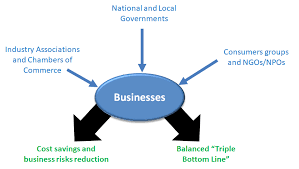Introduction to Sustainable Business
Sustainable business refers to the practice of conducting operations in a manner that is environmentally, socially, and economically sustainable. This multifaceted concept emphasizes the importance of integrating sustainability into all aspects of a business’s strategy and operations. The significance of sustainable business is increasingly pertinent in today’s global economic landscape, as environmental challenges, social inequities, and the demand for financial viability come to the forefront of corporate responsibilities.
At its core, sustainable business operates under three fundamental principles: environmental responsibility, social equity, and economic viability. Environmental responsibility calls for businesses to minimize their ecological footprint through resource-efficient practices, waste reduction, and the promotion of renewable energy sources. This involves adopting methods that not only meet current demands but also ensure the preservation of the planet for future generations. For instance, many companies are now committing to carbon neutrality or implementing circular economy practices that prioritize recycling and reuse of materials.
Social equity, the second principle, revolves around the impact businesses have on society. This entails creating fair labor practices, fostering inclusive workplaces, and supporting the communities in which they operate. By championing diversity and supporting local initiatives, sustainable businesses can contribute to social well-being and nurture stronger community ties. Such an approach also enhances a company’s brand reputation and can lead to increased customer loyalty.
The final pillar, economic viability, emphasizes the need for businesses to operate profitably while adhering to sustainable practices. It underscores that sustainability is not merely a compliance issue but a strategic advantage. Companies that prioritize sustainability can reduce costs, attract conscientious consumers, and foster innovation—all of which contribute to long-term financial success. In today’s economy, where stakeholders increasingly favor ethical practices, a commitment to sustainable business can differentiate a company in a crowded marketplace.
The Importance of Ecosystem Sustainability
Ecosystem sustainability is paramount for maintaining the health of our planet and ensuring the prosperity of future generations. An ecosystem embodies a complex network of interactions between living organisms and their physical environment. For businesses, understanding this interconnectedness is vital, particularly in how their operations can both positively and negatively impact biodiversity and ecosystem balance. By embracing sustainable practices, businesses can significantly contribute to ecosystem resilience and diversity.
Biodiversity is a key element of ecosystem sustainability. It encompasses the variety of life forms within a given habitat and is crucial for maintaining ecological processes and functions. Businesses can play a pivotal role in preserving biodiversity by adopting eco-friendly technologies, reducing waste, and implementing initiatives that protect natural habitats. For instance, companies involved in agricultural practices can implement sustainable farming techniques that enhance soil health, improve water quality, and promote a thriving ecosystem, thereby mitigating their environmental footprint.
The balance of ecosystems is another essential aspect of sustainability. Disruptions caused by industrial activities can lead to habitat destruction, pollution, and depletion of resources. Such practices jeopardize both the ecosystem services that businesses rely on and the health of local communities. A notable case study is that of a textile manufacturer that transitioned to water-efficient processes and utilized organic materials. This shift not only minimized water usage but also supported local biodiversity by reducing harmful runoff into waterways.
Incorporating sustainable business models ultimately fosters community engagement and environmental stewardship. When businesses recognize their responsibility towards ecosystem sustainability, they create a ripple effect, inspiring other organizations and individuals to follow suit. The collective efforts toward sustainable development are essential for promoting a balanced ecosystem, securing natural resources, and fostering community well-being. Hence, businesses must prioritize practices that align with the principles of sustainability to forge a path that benefits both ecosystems and communities alike.
How Sustainable Business Models Benefit Communities
Sustainable business models are increasingly recognized for their positive impact on local communities. These models prioritize not only profitability but also social and environmental considerations, leading to substantial benefits for the communities they serve. One of the most notable advantages of integrating sustainability into business practices is the potential for job creation. By focusing on sustainable methods, businesses can generate employment opportunities that are often tailored to meet the unique needs of local populations. This not only helps to reduce unemployment rates but also fosters a sense of stability and economic empowerment within communities.
Moreover, sustainable businesses actively engage with their communities, creating meaningful partnerships that contribute to social well-being. Through community engagement initiatives such as local sourcing of materials, businesses bolster the local economy by supporting neighboring suppliers and vendors. This cyclical economic support helps to retain wealth within the community, thereby enabling further growth and development. For example, restaurants that prioritize farm-to-table practices often collaborate with local farmers, which strengthens local agriculture and ensures food fresh and healthy.
Additionally, sustainable business models often emphasize social equity, addressing disparities through fair labor practices and inclusivity. Companies that implement policies advocating for diversity, equitable pay, and employee well-being can create a more equitable work environment and inspire other businesses to follow suit. This approach not only improves employee morale but also increases overall productivity, leading to enhanced service quality within the community.
Countless examples of successful community-focused businesses illustrate these points. A notable instance is a cooperative grocery store that sources its products from local farms, contributing to both the community economy and the promotion of sustainable agriculture. Such practices showcase how sustainable business models can serve as a powerful catalyst for long-term community prosperity.
Economic Advantages of Sustainable Practices
Adopting sustainable business practices offers a myriad of economic advantages that not only benefit the organizations themselves but also contribute positively to the broader community and ecosystem. One of the most significant benefits is the potential for substantial cost savings through resource efficiency. By optimizing resource use—such as energy, water, and raw materials—businesses can significantly reduce operational costs. Implementing measures such as energy-efficient technologies and waste reduction initiatives allows companies to minimize their expenses, leading to improved profit margins.
Moreover, in an era where consumers are increasingly environmentally conscious, embracing sustainability can enhance brand loyalty. Customers are more inclined to support businesses that demonstrate a commitment to environmental stewardship. As a result, organizations that prioritize sustainable practices often experience increased customer retention and positive brand perception, leading to a competitive edge in the marketplace. Additionally, this brand loyalty translates into enhanced sales and market share, as consumers actively seek to align their purchases with their values.
Attracting conscious investors is another tangible economic benefit of sustainability. With the rise of socially responsible investing, many investors are now considering a company’s sustainability initiatives when making investment decisions. Businesses that showcase a commitment to sustainability are likely to attract a growing pool of investors interested in promoting ecological and social considerations alongside financial returns. This influx of investment can provide businesses with the capital needed to expand their sustainable practices further, creating a virtuous cycle of growth and positive impact.
Finally, prioritizing sustainability can also enhance the long-term economic viability of a business. As regulations on environmental practices become more stringent, companies that have already integrated sustainability into their operations will be better equipped to adapt, ensuring compliance and minimizing the risks associated with potential penalties. Ultimately, the economic advantages of sustainable practices can lead to a resilient, profitable enterprise while simultaneously benefiting the communities and ecosystems in which they operate.
Challenges Faced by Sustainable Businesses
Sustainable businesses often encounter a range of challenges that can hinder their efforts to implement eco-friendly practices. One primary obstacle is the initial investment costs associated with transitioning to sustainable operations. For many organizations, the financial burden of upgrading infrastructure, adopting new technologies, and sourcing sustainable materials can be significant. These upfront costs, while often justified in the long term by savings and efficiencies, can deter businesses, especially small and medium enterprises, from pursuing a sustainable model.
Another challenge stems from market competition. Businesses committed to sustainability may find themselves at a disadvantage when competing against conventional firms that prioritize cost-cutting over eco-friendly practices. Many consumers tend to gravitate towards the lowest-priced options, often overlooking the long-term benefits of sustainability. This competition can create a paradox where sustainable businesses struggle to maintain profitability while adhering to their environmental commitments.
Consumer awareness plays a critical role in determining the success of sustainable efforts. Many potential customers may not fully understand the importance of sustainable practices or how their choices impact the environment. This lack of awareness can limit the market for sustainably produced goods and services. To address this issue, businesses must invest in educating their customers about the benefits of sustainable products, effectively communicating the value they bring not only to the individual but also to the community and ecosystem at large.
Fortunately, there are strategies that sustainable businesses can adopt to overcome these challenges. For instance, forming partnerships with other organizations can help share costs and resources, while collaborative marketing efforts can raise consumer awareness and appreciation for sustainable products. Additionally, leveraging technology to improve operational efficiencies can further reduce long-term costs. By navigating these obstacles, sustainable businesses not only contribute to ecological well-being but also position themselves for success in a competitive marketplace.
The Role of Technology in Promoting Sustainability
In recent years, technological advancements have played a crucial role in promoting sustainability within the business sector. Various innovations have emerged that enable companies to adopt sustainable practices, improve resource management, and minimize their environmental impact. These technologies often focus on renewable energy sources, waste reduction strategies, and the integration of digital solutions.
Renewable energy technologies, such as solar panels and wind turbines, are at the forefront of sustainable business practices. Many organizations have transitioned to these energy sources to reduce greenhouse gas emissions and reliance on fossil fuels. For instance, companies like Tesla not only manufacture electric vehicles but also invest significantly in solar energy solutions, demonstrating a commitment to sustainability. The implementation of such technologies not only fosters an eco-friendly image but also often leads to significant cost savings in the long run.
Additionally, innovations aimed at waste reduction have gained momentum in various industries. For example, companies like Unilever have developed programs focused on reducing plastic waste by utilizing biodegradable materials and adopting circular economy practices. This not only helps in decreasing landfill contributions but also attracts environmentally conscious consumers. Technology has enabled businesses to track and manage waste more effectively, using tools that provide insights into production processes and identify areas for improvement.
Furthermore, digital solutions play an essential role in resource management. Software applications and data analytics allow organizations to monitor their resource consumption in real-time, optimizing processes and reducing inefficiencies. For instance, the use of the Internet of Things (IoT) enables companies to establish smart systems that automatically adjust energy usage based on demand, ultimately lowering overall consumption. With these advancements, businesses can effectively reduce their carbon footprint while enhancing operational efficiency.
Overall, technology serves as a powerful catalyst for sustainability, empowering organizations to implement smarter practices that benefit both the environment and their bottom line. By adopting these innovative solutions, businesses contribute to the improvement of ecosystem health and the vitality of the communities they serve.
Policy and Regulation Impacting Sustainable Business
The promotion of sustainable business practices heavily relies on the existing framework of government policies and regulations. These frameworks not only set mandatory compliance for businesses but also provide incentives to foster sustainability initiatives. Laws aimed at reducing carbon footprints, minimizing waste, and encouraging the use of renewable resources are critical in shaping corporate behavior. For example, many countries have implemented regulations that require businesses to report their environmental impacts, pushing them toward transparency and accountability.
Additionally, financial incentives such as tax breaks, grants, and subsidies are often provided to organizations that adopt sustainable practices. These incentives can significantly offset the costs associated with transitioning to greener technologies or processes. By lowering the financial barriers that businesses face when integrating sustainable practices, policies can effectively encourage both small enterprises and large corporations to commit to sustainability goals.
Corporate social responsibility (CSR) also plays a pivotal role in the intersection of business and regulation. It emphasizes the importance of ethical behavior and sustainable operations, extending beyond legal obligations to include the expectations of consumers, communities, and shareholders. Companies increasingly recognize that a strong commitment to CSR not only enhances their reputation but also aligns them more closely with the evolving regulatory landscape, making them more resilient to policy changes.
However, while current regulatory frameworks have made strides in supporting sustainable development, there remains room for improvement. Enhanced collaboration between governments and the private sector is essential to create more effective and adaptive regulations. Businesses often advocate for clearer guidelines and standards that can assist them in making sustainable choices, whereas policymakers can benefit from insights provided by industry leaders to develop informed strategies. Ultimately, productive partnerships and thoughtful regulations are vital for driving the momentum of sustainable business practices.
Future Trends in Sustainable Business
The landscape of sustainable business is rapidly evolving, driven by a collective recognition of environmental and social imperatives. A key trend gaining traction is the growing demand for transparency. Consumers, empowered by technological advancements, are increasingly seeking information about the sourcing and ethical practices behind the products they purchase. This heightened awareness compels businesses to provide clear, accessible information regarding their operations and supply chains. Companies adopting transparent practices often enhance their reputations, thus fostering greater trust and loyalty among their customer base.
Another significant shift observed in sustainable business practices is the movement toward circular economies. Unlike the traditional linear model, which follows a ‘take-make-dispose’ pattern, circular economies prioritize the continual reuse, refurbishment, and recycling of materials. This approach not only reduces waste but also fosters innovation in product design and resource management. Businesses are now focusing on life-cycle assessments and considering the environmental impact of their products from inception through disposal. As this trend matures, we can expect a proliferation of sustainable materials and a profound transformation in manufacturing processes across various sectors.
Additionally, the integration of sustainability into business education is becoming increasingly prevalent. Academic institutions are recognizing the necessity of equipping future leaders with the knowledge and skills to navigate the complexities of sustainability within the corporate world. Curricula are evolving to include cross-disciplinary approaches, emphasizing sustainable development objectives and encouraging entrepreneurial creativity in solving environmental challenges. This shift in education aligns with changing consumer behavior, as individuals increasingly prioritize sustainability in their purchasing decisions, pushing businesses towards more sustainable operations and practices.
Conclusion: The Path Forward for Businesses and Communities
In reviewing the profound benefits of sustainable business practices, it is clear that fostering environmental stewardship is not merely an option but a necessity for the health of our ecosystems and the communities we inhabit. Sustainable business initiatives contribute to ecological balance, highlighting the importance of recognizing our interdependence with nature. By embracing sustainability, businesses can mitigate their negative impacts on the environment and enhance the wellbeing of the local and global communities they serve.
The integration of sustainable practices leads to an array of advantages, including efficient resource use, reduced waste, and improved brand loyalty among consumers increasingly seeking environmentally responsible options. This shift not only aligns with consumer demand but also strengthens the resilience of businesses in the face of economic uncertainties. Moreover, businesses that prioritize sustainability contribute positively to their communities by creating jobs, fostering innovation, and ensuring the longevity of local resources.
For sustainable business to thrive, collective action is essential. A collaboration between businesses, government entities, and consumers can forge pathways toward greater sustainability. Policymakers are called upon to create frameworks that encourage sustainable practices, while businesses should commit to transparency and environmentally friendly operations. Consumers play a critical role as well; their voices can drive change by supporting brands dedicated to sustainability. Together, every layer of society has a stake in promoting a sustainable future.
In conclusion, the interconnectedness of sustainable business practices, ecological health, and community wellbeing underscores the importance of a united approach. The urgent need for sustainable strategies fosters new opportunities for growth not only for businesses but also for society as a whole. By taking deliberate steps towards sustainability, we pave the way for a better future—a future where thriving ecosystems and vibrant communities can coexist harmoniously.
How useful was this post?
Click on a star to rate it!
Average rating 0 / 5. Vote count: 0
No votes so far! Be the first to rate this post.









